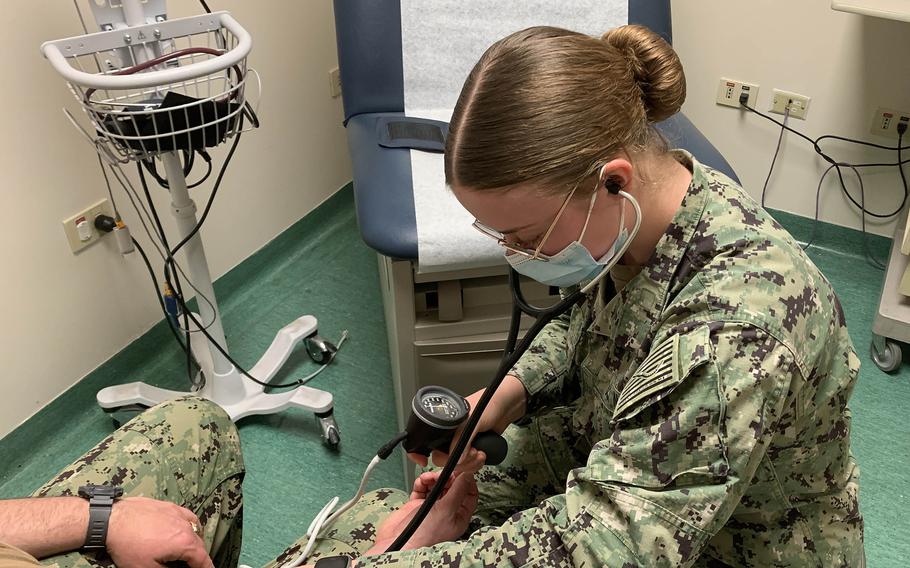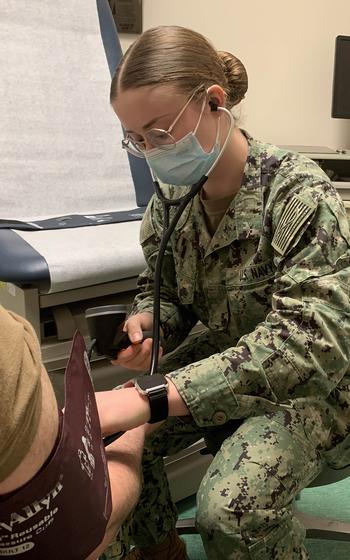
Seaman Apprentice Krista Fitch takes the blood pressure of a sailor at the active-duty medical clinic at Naval Support Activity Naples in Italy on April 20, 2023. A program at the base seeks to improve service members' health with a focus on guiding those whose blood pressure could be a precursor to major medical issues. (Alison Bath/Stars and Stripes)
NAPLES, Italy — A joint effort at Naval Support Activity Naples to tackle high blood pressure among active-duty service members is seeing success in getting them to be more conscientious about their overall health.
Service members flagged during routine exams are encouraged to seek follow-up care and counseling to address their blood pressure, U.S. Naval Hospital Naples and Navy Marine Corps Relief Society officials said.
But since October 2022, that advice has been reinforced by referral to a new program that includes a relief society visiting nurse able to provide focused follow-up care.
In that time span, flagged service members’ completion rate for necessary blood pressure checks has gone from just 7% before the existence of the program to 43% now, said Cmdr. Robyn White, a family nurse practitioner at the base’s active-duty clinic.
The data track service members referred to the program from Oct. 1, 2022, through Feb. 28, she noted.
The checks are vital in determining whether a flagged blood pressure reading is an anomaly or an indication of a deeper problem, White said.
High and elevated blood pressure are among the top diagnoses for active-duty service members seeking medical care at NSA Naples, said Lt. Cmdr. Courtney Bailey, a clinic nurse who spearheaded the program along with relief society nurse Emily Mitalas.
Through the program, service members thought to have or be at risk of developing the conditions can see Mitalas, who instructs them about the importance of following up with blood pressure checks.
She also offers information about lifestyle changes such as limiting caffeine and salt intake, exercising more and reducing stress.

Seaman Apprentice Krista Fitch takes the blood pressure of a sailor at the active-duty medical clinic at Naval Support Activity Naples, Italy, on April 20, 2023. High and elevated blood pressure are among the top diagnoses at the clinic, officials say. (Alison Bath/Stars and Stripes)
The Navy Marine Corps Relief Society is a private, nonprofit organization that offers services such as financial aid in hardship circumstances to active-duty and retired sailors and Marines and their families.
High-tempo operations, frequent travel and shift work at NSA Naples are some of the factors behind the presence of high or elevated blood pressure in young, healthy service members, mostly in men ages 25 to 35, White said.
The base is home to U.S. Naval Forces Europe-Africa/U.S. 6th Fleet.
Such risk factors as smoking, consumption of energy drinks and other high-caffeine beverages or excessive amounts of alcohol, lack of exercise and weight gain contribute to what officials say is a concerning number of potential cases.
“This is a byproduct of stress and usually obesity,” said White, who added that anxiety also can be a factor in high blood pressure.
Normal blood pressure is lower than 120/80 most of the time, according to Medlineplus.gov. A person is considered to have high blood pressure when either or both of those numbers are consistently above 130/80.
Elevated blood pressure is when the top number is between 120 and 130 and the lower number is less than 80, according to Medlineplus.gov.
Addressing high blood pressure through awareness, lifestyle changes and perhaps medication keeps sailors on the job and ready to do their jobs, officials at NSA Naples said last week.
It also reduces susceptibility to complications such as stroke, heart attack or cardiovascular disease, they said.
Mitalas’ participation lets the clinic closely follow up with sailors in a personalized way.
Her role “as the visiting nurse is sort of the (connector) between the clinic and patient,” she said.
White pointed out another benefit. The program also demonstrates a way to promote health instead of tackling disease among sailors, she said.